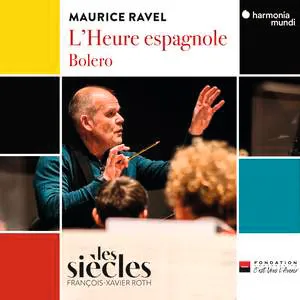
Ravel L’Heure espagnole; Bolero Isabelle Druet, Julien Behr, Loïc Félix, Thomas Dolié, Jean Teitgen; Les Siècles/François-Xavier Roth Harmonia Mundi HMM905361 64:36 mins
Ravel’s comédie musicale, L’Heure espagnole, was considered pornographic by one early critic, while the director of the Parisian Opéra-Comique, Albert Carré, refused it a premiere for four years before capitulating. Even modern audiences will sense its free and easy attitude to desire and sexuality, though its place in the repertoire – as an occasional, but certainly welcome visitor – is now assured.
An admirer of Ravel keen to bring his knowledge of period instruments to his support, François-Xavier Roth has selected exactly those the composer wanted for the score – including such rarities as the sarrusophone for L’Heure espagnole, and in the filler here named ‘Bolero’ (Roth insists that the acute accent is incorrect) two tabors instead of the regular single side-drum. In both scores, Ravel’s sense of instrumental characterisation is crucial, and the results are delectable. All the instruments used are listed in the booklet alongside their players.
But the voices are just as crucial. Roth has, again, been highly selective with his singers – all Francophone and strikingly well matched to their roles: Isabelle Druet’s bright and blowsy Concepción; Loïc Félix as her apparently shy husband, Torquemada the clock shop owner; the lovelorn lyricism of Julien Behr’s poet Gonzalve; Jean Teitgen’s fruity bass as entitled banker Don Iñigo; and Thomas Dolié’s obliging – and distinctly hunky – muleteer, Ramiro, distracted from observing Concepción’s affaires by being asked to haul grandfather clocks – often with lovers hidden within – up and down the stairs.
The opera’s characteristic rhythms – halting waltzes and various Iberian idioms – are suggestively infiltrated into the performance, while Bolero, performed neither too fast nor too deliberately, retains its quality as a light and playful dance.
George Hall